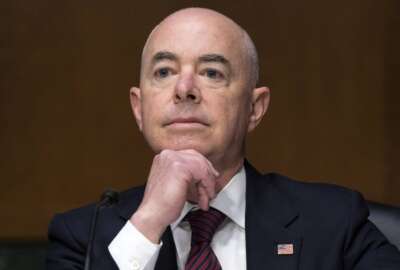How the pandemic and its aftermath continue to roil the federal workforce
Eagle Hill Consulting research found the pandemic and the way it scrambled how people work has sparked what they call a great re-evaluation.
Best listening experience is on Chrome, Firefox or Safari. Subscribe to Federal Drive’s daily audio interviews on Apple Podcasts or PodcastOne.
Women federal employees are less likely than men to stick around should a good job offer come from somewhere else. That’s one finding of new research by Eagle Hill Consulting. Researchers found the pandemic and the way it scrambled how people work has sparked what they call a great re-evaluation. For more, Eagle Hill’s CEO Melissa Jezior spoke to the Federal Drive with Tom Temin.
Interview transcript:
Tom Temin: Ms. Jezior, good to have you on.
Melissa Jezior; Thank you, Tom, great to be here.
Tom Temin: And you’ve been following closely people’s work reactions and work attitudes throughout the pandemic. And are there special reactions, special issues for the female side of the federal workforce?
Melissa Jezior; Yes. So in the research that we released last week, it turns out both men and women working for the federal government say they feel burnt out. And it’s pretty balanced. I think women it’s 59%, men are 56% feeling burnt out. But what’s interesting is the reasons they cite for why they feel burnt out are different. So men are more likely to cite workload as their primary source of burnout, whereas women tend to point to a lack of communication, lack of feedback and support.
Tom Temin: Interesting, and does the telework figure into this? Because there are so many opinions about telework. Some people never want to leave it. Some people can’t wait to leave it. Others want to do both. Is that a factor in all of these attitudinal findings?
Melissa Jezior; It absolutely could be. One of the findings for women is also that connection plays a part in their, or their lack of feeling connected plays a part in them feeling burnt out. So you could draw the connection, no pun intended, that telework makes it harder for people to truly connect with one another.
Tom Temin: Right, I’ve read a story just the other day in one of the national newspapers that people are getting kind of Zoom burnout. A lot of people don’t like looking at themselves when speaking with other people and some people get used to it, some people never really do. And so I imagine that’s a factor in the telework equation.
Melissa Jezior; For sure. I also think that who you end up connecting with, gone is the watercooler running into someone at the lunch room or whatnot, you have to be very intentional with who you talk with. And sometimes that creates challenges, I think.
Tom Temin: Right and less spontaneity. What other findings stand out to you from the research?
Melissa Jezior; Well, I think one other thing that stands out that supports some of this research that we’re just talking about is that we’re about to release more research on burnout as it relates to public versus private sector. And what we’re finding is that the government workers are far more burnt out than their private sector colleagues. So I think 65% of government workers report burnout versus 49% of the general population.
Tom Temin: Well, what is burnout? Let’s define the terms here a little bit first.
Melissa Jezior; I think burnout is about how people are feeling overwhelmed, not able to feel like they’re delivering at their peak performance, feeling tired, disconnected, I think that’s how we are looking at burnout. And I think we look as well as some of the factors that contribute to burnout, such as workload, lack of communication, lack of feedback, lack of support, lack of connection.
Tom Temin: And maybe the sustained sense of that feeling is what makes burnout.
Melissa Jezior; For sure.
Tom Temin: Everybody feels that way for an hour or two or occasionally every day.
Melissa Jezior; Yes, it is the persistence, yes, agreed.
Tom Temin: And maybe just briefly review the survey methodology that you used.
Melissa Jezior; It was a national poll done by Ipsos of over 1,000 federal workers.
Tom Temin: So you contract out the polling and you get a sample that is considered projectable across the population.
Melissa Jezior; Exactly.
Tom Temin: So more people in the new numbers show more people in the federal government are feeling burned out relative to the private sector. The question then is, what is your best advice for federal managers who have to deal with this because the return to the office is haphazardly occurring, and it varies from agency to agency. So what should managers be thinking about what actions can they take?
Melissa Jezior; Great question. I think federal leaders must understand at a deep level the issues that [are] facing their workers in their agencies, and then devise a tailored employee experience that will keep their talented and committed feds. So, feds are typically mission-driven people so I think you can keep them if you work at it. So a couple of thoughts are doubling down on workplace flexibility. I think the private sector has caught up a lot to the federal sector in terms of allowing flexibility. So I think getting a lot more creative. In terms of what more can the government offer, I think engaging with employees to figure out the precise cause of burnout and developing targeted plans to address some of those problems. Also making performance management about productive two-way feedback and career development and coaching would be helpful. And then last, but not least, I think just finding great creative ways to express appreciation.
Tom Temin: Interesting, and are there good examples of companies doing these things in the private sector as we try to get people back that weren’t already back, such as in the service and restaurant industries and so forth?
Melissa Jezior; Yes. I mean, I think this was a question the whole world is dealing with as we’re all going back from a pandemic, and we’re going into a hybrid environment. I think lots of different organizations are trying different things. I don’t know if anyone has completely got it right yet.
Tom Temin: And getting back to the question of the issues for female employees versus male employees in the federal government. You mentioned very different drivers of the feeling of being disconnected or burned out whatever the case might be. Men in general cite the workload, women cite communications and other maybe less tangible items. So it seems like sensitive managers or managers that care about this can tailor their responses to individuals, not even to genders but to actual people.
Melissa Jezior; For sure, I think different employees have different reasons for burnout. So I think the best advice we can have is talk to your employees. Find out what specifically they’re struggling with, and building tailored, personalized responses to those issues.
Tom Temin: Right. So these are really universal themes that have nothing necessarily to do with the pandemic, which maybe it’ll never be over, it seems like I don’t know anyone that has not been infected at some point to some degree at this point. But these seem like universal kind of ideas.
Melissa Jezior; I think burnout has been festering problem across the workforce even before the pandemic. But I think what the pandemic did was bring this to the forefront. And it’s something now that people are talking about, people are thinking about and people are actually trying to address.
Tom Temin: And to that question we talked with in the beginning here at the start of the interview, which is that a greater percentage of women would like to leave if they had the opportunity. What is your best thought on how to make sure that people don’t feel that way? Because there’s a talent management issue pretty much across the board in the economy.
Melissa Jezior; Yes, right now, 49% of government workers say they’re more likely to leave their organization in the next year compared to only 34% of the general population. So I think we’ve been talking a lot about burnout, I do think burnout is a great way to start really figuring out how to keep your people. It’s really focusing on addressing burnout as a systemic problem at your agency.
Tom Temin: And have you talked to OPM about these findings? And have you compared your work against some of the surveys they do? And they’ve been doing these pulse surveys and so forth, and not sure how much they really tell anybody, but any thoughts there?
Melissa Jezior; We have not talked to OPM specifically about these findings. But I believe our polling is slightly different than some of the work that OPM has been doing.
Tom Temin: Any final thoughts here on your findings?
Melissa Jezior; I just think that the Great Resignation is a tremendous challenge for federal agencies, and the more they can do to really focus on keeping their highly talented government workers, the better off they’ll be in the long run.
Tom Temin: Melissa Jezior is CEO of Eagle Hill Consulting. Thanks so much for joining me.
Melissa Jezior; Awesome. Thank you, Tom.
Copyright © 2025 Federal News Network. All rights reserved. This website is not intended for users located within the European Economic Area.
Tom Temin is host of the Federal Drive and has been providing insight on federal technology and management issues for more than 30 years.
Follow @tteminWFED






